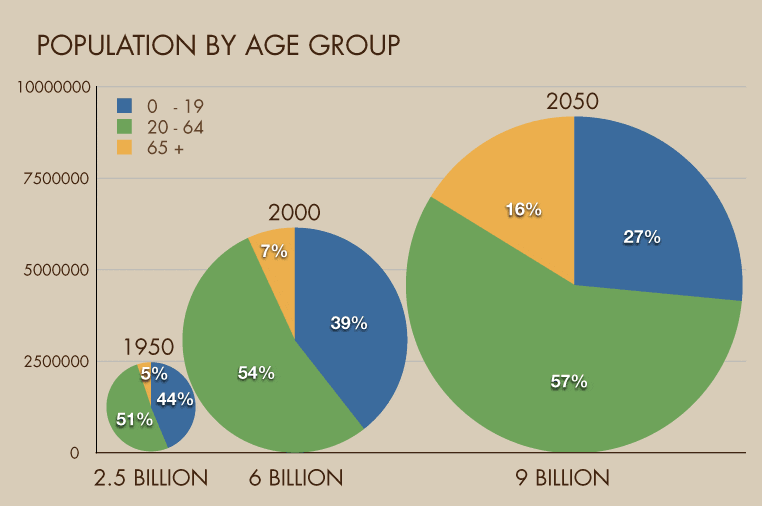
Worldwide, life expectancy of older people continues to rise. By 2020, for the first time in history, the number of people aged 60 years and older will outnumber children younger than 5 years.
By 2050, the world’s population aged 60 years and older is expected to total 2 billion, up from 841 million today. 80% of these older people will be living in low-income and middle-income countries [Paper 1].
The increase in longevity, especially in high-income countries (HICs), has been largely due to the decline in deaths from cardiovascular disease (stroke and ischaemic heart disease), mainly because of simple, cost-effective strategies to reduce tobacco use and high blood pressure, and improved coverage and effectiveness of health interventions.
However, although people are living longer, they are not necessarily healthier than before— nearly a quarter (23%) of the overall global burden of death and illness is in people aged over 60, and much of this burden is attributable to long-term illness caused by diseases such as cancer, chronic respiratory diseases, heart disease, musculoskeletal diseases (such as arthritis and osteoporosis), and mental and neurological disorders [Paper 2].
This long-term burden of illness and diminished wellbeing affects patients, their families, health systems, and economies, and is forecast to accelerate. For example, latest estimates indicate that the number of people with dementia is expected to rise from 44 million now, to 135 million by 2050.
“Deep and fundamental reforms of health and social care systems will be required,”* says Dr John Beard, Director of the Department of Ageing and Life Course at the World Health Organization (WHO), and co-leader of the Series with Dr Ties Boerma and Dr Somnath Chatterji, also from WHO. “But we must be careful that these reforms do not reinforce the inequities that drive much of the poor health and functional limitation we see in older age.”*
The Latest on: Ageing population
[google_news title=”” keyword=”Ageing population” num_posts=”10″ blurb_length=”0″ show_thumb=”left”]
via Google News
The Latest on: Ageing population
- Push for NSW and WA to join national accessible building code to future-proof housing for ageing populationon April 26, 2024 at 3:55 pm
A building design standard to ensure all new houses are accessible for people with disability could future-proof the nation's housing stock. But not every state is onboard.
- Care for aging population in jeopardy without increased fundingon April 26, 2024 at 9:27 am
On April 22, The Centers for Medicare and Medicaid Services (CMS) finalized the “Ensuring Access to Medicaid Services” rule, incorporating an “80-20” provision. This mandates that providers of home- ...
- Rare mutation that causes short stature may shed light on ageingon April 26, 2024 at 8:00 am
The genetic variant, which causes people to be insensitive to growth hormone, may also protect people from heart disease ...
- As LI’s older population grows, so does the need for elder care serviceson April 26, 2024 at 7:14 am
The aging population on Long Island and elsewhere continues to increase, experts say. With these demographics comes a growing need for services for older adults. This includes legal, health, ...
- Silver service – Retailers must adapt to cater for our ageing populationon April 24, 2024 at 5:00 pm
Photo: Getty The world’s population is ageing, and many consumers believe the retail world is not ready for this change in demographic profile. In Ireland, the number of people aged over 65 has ...
- BRIEFS: China’s ageing population set to increase opportunities for legal workon April 24, 2024 at 2:12 pm
China is grappling with an escalating demographic crisis. In 2023, the senior population has ballooned by 30 million in the world’s second-largest economy, taking the total size of the elderly class ...
- Charting a roadmap for North Carolina’s growing 65-plus populationon April 24, 2024 at 1:34 pm
From 2021 to 2041, the state’s older population is expected to grow from 1.8 million people to 2.7 million. If you focus on the 85-and-older population, a 114 percent increase is projected — going ...
- Silver hair, silver dollars: Wyoming's aging population means big spending for the stateon April 24, 2024 at 12:21 pm
The graying of America, and Wyomingites, need long-term care in the coming decades. How will the state deal with the cost?
- China's ‘Netflix' iQiyi pivots toward an aging population in an AI eraon April 23, 2024 at 12:04 am
IQiyi founder Gong Yu also pointed to estimates that predict about one-fourth of China’s population will be considered elderly in 2033.
- Are we ready for a shrinking working-age population?on April 21, 2024 at 5:00 pm
In a few years, the working-age population will begin falling, and it will keep falling for the foreseeable future. While this happens, baby boomers will continue to retire, and so the ...
via Bing News









